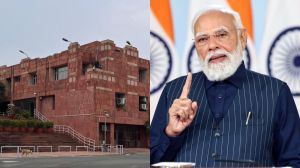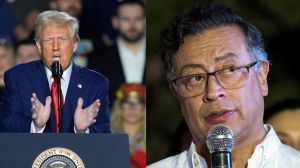Hands-off Bush vs Gore, the preacher 8212; Delhi waits
New Delhi, November 7: For India and Pakistan, the difference between Al Gore and George Bush could mean the difference between an intrusi...

New Delhi, November 7: For India and Pakistan, the difference between Al Gore and George Bush could mean the difference between an intrusive administration and a hands-off Washington that would rather not pretend to be the world8217;s most effective policeman.
As India sees it, there are four issues and a phenomenon 8212; the phenomenon being outgoing President Bill Clinton 8212; through which to see the two candidates: Kashmir, non-proliferation, China and trade matters.
It was during the Reagan-Bush years from 1980-92, for example, that the US became India8217;s largest trading partner, MoUs on technology transfer and science amp; technology was signed, as was the agreement to build the Light Combat Aircraft.
In contrast, save for the hugely popular, latter-day Clinton, the Democrats are remembered for their hectoring after Pokharan and the fact that except for a few humanitarian loans, sanctions on defence, technology and international financial institutions, still remain in place.
8220;There was actual delivery on the ground during the Republican years,8221; says Shirin Tahir-Kheli, a member of the US National Security Council across the Reagan-Bush administrations, adding, 8220;The Republicans were interested in the totality of the relationship with India while Gore seems to be looking at the Indian-American community as fundraisers for his campaign.8221;
A cautious New Delhi is not officially saying a word although Principal Secretary Brajesh Mishra and Foreign Secretary Lalit Mansingh received Paul Wolfowitz, a top Bush defence and security policy aide, in the capital about ten days ago.
Wolfowitz8217;s invitation came from the CII but the fact remains that no policy handler or thinker who owes allegiance to the Democratic party has surfaced in the capital in recent weeks.
But let8217;s hear it straight from the mouths of the candidates. In an interview in the September issue of Arms Control Today, both Gore and Bush were asked about India and Pakistan and whether the US should seek to stabilize the nuclear balance in South Asia.
According to Bush: 8220;This coming century will see democratic India8217;s arrival as a force in the world. India is now debating its future and strategic path and the US must pay it more attention. We should work with the Indian government, ensuring it is a force for stability and security in Asia. This should not undermine our longstanding relationship with Pakistan, which remains crucial to the peace of the region.8221;
Gore in the same interview, meanwhile, sought to re-circumscribe relations with the region in terms of the 8220;nuclear flashpoint8221; theory that has dominated the Indo-US debate over the last couple of years, since Pokharan and over Kargil. With Clinton out of the picture, analysts here fear that Gore will also point a sticky finger at Third World abnegation of labour and environmental issues and even link it with trade.
8220;India8217;s and Pakistan8217;s 1998 tests,8221; said Gore, 8220;were a great source of international concern and a reminder that nuclear non-proliferation in South Asia poses a continuing challenge. Cognizant of regional dynamics and insecurities, we should work with India and Pakistan to guard against a nuclear arms race on the sub-continent. We must persuade then to join the NPT regime and sign the CTBT.8221;
It was during the Bush years that the Pressler amendment 8212; which prevented the sale of US arms to Pakistan 8212; came into being, that Pakistan was put on the 8220;watchlist8221; of states sponsoring terrorism. And even though the Reagan administration earlier seemed grateful enough to Islamabad for agreeing to be the frontline state on Afghanistan, the 8220;decoupling8221; of Washington8217;s India-Pakistan policy took place during the Republican era.
China, Asia8217;s other rising power, is another area of difference between the two. Bush has gone on record to say that he will take a much tougher line against Beijing 8212; something that secretly pleases New Delhi, which cannot forget the 8220;all-weather relationship8221; between China and Pakistan. The Clinton-Gore duo will be remembered for capitulating on their professed determination to slam the Communist state for its violations on human rights as well as non-proliferation issues.
- 01
- 02
- 03
- 04
- 05































